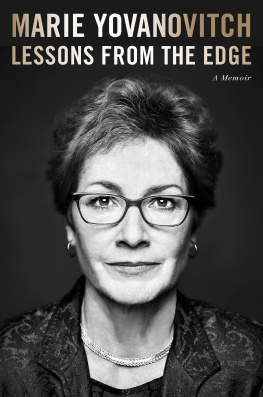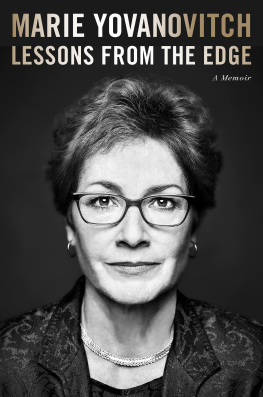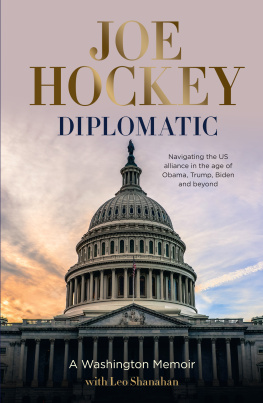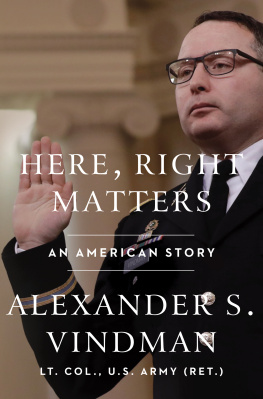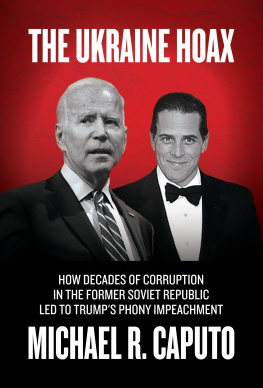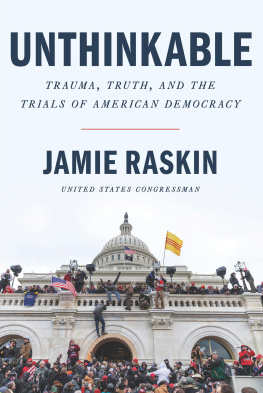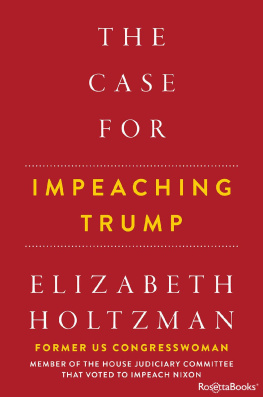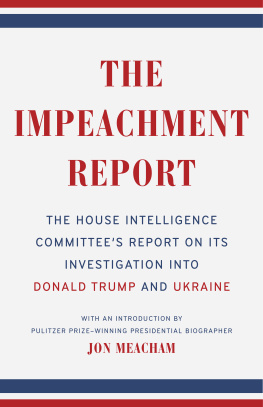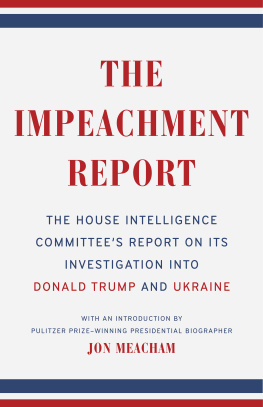To my parents, Nadia and Michel
And now these three remain:
Faith, hope, and love;
but the greatest of these is love.
1 CORINTHIANS 13:13
Contents
I KNEW IT WAS OVER . The coordinated campaign of lies and innuendo had done its job. I wasnt going to be the U.S. ambassador to Ukraine for much longer.
It was Saturday, March 23, 2019, and I was at my official residence, a historic building in downtown Kyiv. That morning offered my first moment of relative calm after a typically busy seventy-hour workweek. I finally had the time to fully focus on the storm brewing back home.
Before me on the kitchen table was a packet of materials that had grown to considerable size since my press staff had begun sending it to me early Thursday morning. The first articles in the packet dated to Wednesday, when the Washington-based political website The Hill had posted several stories alleging American malfeasance in Ukraine, including by me. One quoted a corrupt Ukrainian prosecutor who claimedfalselythat I had tried to shield certain favored Ukrainians from prosecution by his office. A companion article detailed an equally untrue but even more damaging assertion in Donald Trumps Washington: that I had repeatedly spoken with disdain about the presidents administration.
Other pages in the packet revealed that the Hill stories had gone viral back home. Most concerning, President Trump himself had tweeted about a piece appearing in The Hill after one of his favorite news sources, Fox News host Sean Hannity, had devoted part of his primetime show that first night to the manufactured scandal.
The rest of the news packet included follow-on news articles, interviews, blog postings, and tweets from right-wing commentators, many of whom had Trumps ear. They were filled with vitriol, slamming me for fictitious acts of corruption and disloyalty to the president. One alarming tweet directed at me featured a photo of a noose with the words Its for you.
Over the course of my thirty-three-year career in the Foreign Service, much of it spent in the countries of the former Soviet Union, I had seen this type of disinformation operation before. Oligarchs, unscrupulous officials, and government agencies, or some combination of the three, had frequently launched disinformation campaigns to destroy commercial competitors and domestic political opponents. They disseminated their fictions so effectively that baseless rumors quickly became generally accepted factsor viewed as factual enough.
Sometimes American diplomats were targeted, as a way to discredit our diplomacy. But such efforts universally failed with the only audience that counted in America. In my experience, the State Department had always responded robustly, making clear that the information was false and that the embassy and the targeted diplomat enjoyed the full support of the U.S. government.
Not this time. This was something as new as it was threatening. Corrupt actors in Ukraine were colluding with corrupt actors in the U.S., and they were successfully influencing our government and our people. It was a shock made all the more devastating by the fact that rather than stopping it, people close to the president of the United States were aiding and abetting the effort. And when Trump waded into the fray by sharing the results of this disinformation campaign with his tens of millions of Twitter followers, he showed how effective the operation had been.
I knew that Trumps tweet almost certainly meant that the plan to remove me would be successful, but I wasnt going down without a fight. I wasnt just concerned with defending my honor, as important as that was to me. I was also thinking about the integrity of the U.S. government, our national security interests, and the continuing success of our bipartisan agenda in Ukraine. The people who were working against me wanted me gone because of the embassys efforts to help reformers fight corruption in Ukraineefforts that stood in the way of their unprincipled plans, which included Trumps tarring his expected 2020 rival, former vice president Joe Biden, with manufactured dirt. If these bad actors won, not only would U.S. interests be undermined, but the victory would also reveal the extent to which personal interests were running U.S. public policy. Even worse, it would encourage shady characters in the U.S. and around the globe to believe that they too could manipulate our policy or get rid of American officials who stood in their way. And it would hand them a road map for how to do it.
I had no choice; I had to fight this. And I firmly believed that the State Department should fight it too. In a flurry of email and WhatsApp messages to my colleagues back in D.C., I urged the department to issue a statement of support. Word came that David Hale, the departments number-three official, was recommending that I deny on the record saying anything disrespectful. Using the abbreviations for Foreign Service officer and president of the United States, he also suggested that I publicly reaffirm [my] loyalty as Ambassador and FSO to POTUS and the Constitution.
It was a devastating response. Rather than jumping to defend me, the department wanted to review the situation and was telling me to put out my own statement. I couldnt believe that I was in this position. And my incredulity was laced with a sense of betrayal. Just two weeks earlier, Hale had asked me to extend my tour as U.S. ambassador to Ukraine; now it felt like I was being hung out to dry. I had served in five previous administrations, both Republican and Democrat. I had never seen anything like this.
Even worse was the nature of the statement that I was being asked to record. Americans pledge allegiance to the flag and to the republic for which it stands; Foreign Service officers, like all government officials, swear an oath to support and defend the Constitution. Pledging fealty to an individual, in contrast, felt downright un-American. We had disposed of that idea in 1776.
I knew in my bones that it was wrongand futile. If the department wasnt going to defend me, and do so very quickly, then defending myself would achieve nothing. But I told myself that I had to try. If foreign and private interests were able to remove me, the message it would sendto allies, adversaries, and Americanswould be extremely damaging. Even more damaging than the political theater I was being instructed to perform.
I sat down at the big wooden desk in my home office, took a sip of my favorite lemon-ginger tea, and tried to center myself. Then I pecked out a short statement and printed it out to review.
As I looked over the piece of paper in my hands, my misgivings grew. What I had written was a message meant for an audience of one. I felt sure that after I had debased myself and our country, Trump would fire me anyway.
There wasnt time to call around for advice, so I asked myself what people whom I admired would do. I thought in particular about my late father. A gentle man born into the chaos of the early Soviet Union, he had fled the Communists and then escaped the Nazis before finding his home in America. He was the most principled person I have ever known. I could almost feel Papas strong and loving presence in the room that day as I sat alone with my words in the gathering gloom. He was reminding me that no job was worth my soul.
Papas memory was the only instruction that I needed. I had spent a lifetime trying to put integrity first. This was not the time to stop.
I set aside the printout and wrote a second statement. This one focused on Ukraines upcoming presidential election. I urged Ukrainians to vote and underscored the importance of free and fair elections and the peaceful transfer of power in a democracy. I added that diplomats like me make a pledge to serve whomever the American people, our fellow citizens, choose... I promote and carry out the policies of President Trump and his administration. This is one of the marks of a true democracy. Even if it wasnt the Trump loyalty pledge that Hale had suggested, I hoped that by embedding the words pledge to serve, Id be giving my colleagues something to take back to State Department leadership. I knew it was unlikely to change their minds, but it was the best I could do without losing my integrity.

